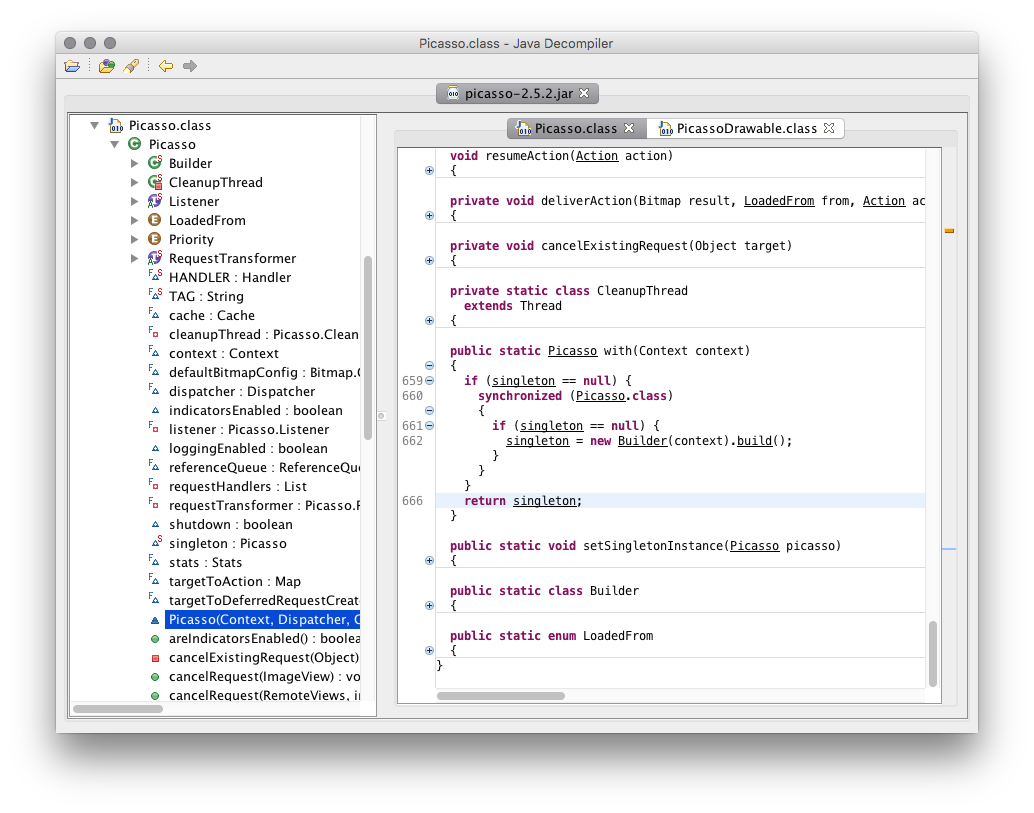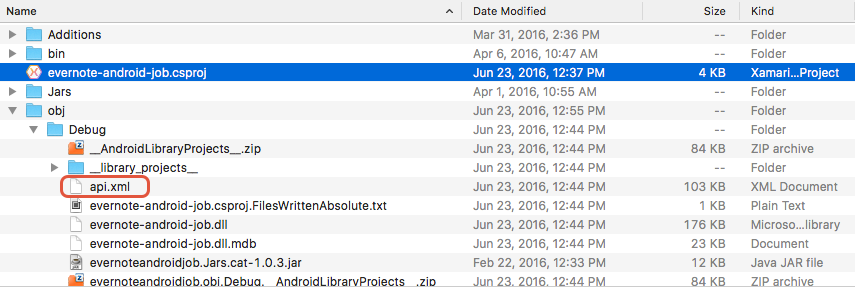Troubleshooting Bindings
Important
We're currently investigating custom binding usage on the Xamarin platform. Please take this survey to inform future development efforts.
This article summarizes serveral common errors that may occur when generating bindings, along with possible causes and suggested ways to resolve them.
Overview
Binding an Android library (an .aar or a .jar) file is seldom a straightforward affair; it usually requires additional effort to mitigate issues that result from the differences between Java and .NET. These issues will prevent Xamarin.Android from binding the Android library and present themselves as error messages in the build log. This guide will provide some tips for troubleshooting the issues, list some of the more common problems/scenarios, and provide possible solutions to successfully binding the Android library.
When binding an existing Android library, it is necessary to keep in mind the following points:
The external dependencies for the library – Any Java dependencies required by the Android library must be included in the Xamarin.Android project as a ReferenceJar or as an EmbeddedReferenceJar.
The Android API level that the Android library is targetting – It is not possible to "downgrade" the Android API level; ensure that the Xamarin.Android binding project is targeting the same API level (or higher) as the Android library.
The version of the Android JDK that was used to package the Android library – Binding errors may occur if the Android library was built with a different version of JDK than the one in use by Xamarin.Android. If possible, recompile the Android library using the same version of the JDK that is used by your installation of Xamarin.Android.
The first step to troubleshooting issues with binding a Xamarin.Android library is to enable diagnostic MSBuild output. After enabling the diagnostic output, rebuild the Xamarin.Android binding project and examine the build log to locate clues about what the cause of problem is.
It can also prove helpful to decompile the Android library and examine the types and methods that Xamarin.Android is trying to bind. This is covered in more detail later on in this guide.
Decompiling an Android Library
Inspecting the classes and methods of the Java classes can provide valuable information that will assist in binding a library. JD-GUI is a graphical utility that can display Java source code from the CLASS files contained in a JAR. It can be run as a stand alone application or as a plug-in for IntelliJ or Eclipse.
To decompile an Android library open the .JAR file with the Java decompiler. If the library is an .AAR file, it is necessary to extract the file classes.jar from the archive file. The following is a sample screenshot of using JD-GUI to analyze the Picasso JAR:

Once you have decompiled the Android library, examine the source code. Generally speaking, look for :
Classes that have characteristics of obfuscation – Characteristics of obfuscated classes include:
- The class name includes a $, i.e. a$.class
- The class name is entirely compromised of lower case characters, i.e. a.class
importstatements for unreferenced libraries – Identify the unreferenced library and add those dependencies to the Xamarin.Android binding project with a Build Action of ReferenceJar or EmbedddedReferenceJar.
Note
Decompiling a Java library may be prohibited or subject to legal restrictions based on local laws or the license under which the Java library was published. If necessary, enlist the services of a legal professional before attempting to decompile a Java library and inspect the source code.
Inspect API.XML
As a part of building a binding project, Xamarin.Android will generate an XML file name obj/Debug/api.xml:

This file provides a list of all the Java APIs that Xamarin.Android is trying bind. The contents of this file can help identify any missing types or methods, duplicate binding. Although inspection of this file is tedious and time consuming, it can provide for clues on what might be causing any binding problems. For example, api.xml might reveal that a property is returning an inappropriate type, or that there are two types that share the same managed name.
Known Issues
This section will list some of the common error messages or symptoms that my occur when trying to bind an Android library.
Problem: Java Version Mismatch
Sometimes types will not be generated or unexpected crashes may occur because you are using either a newer or older version of Java compared to what the library was compiled with. Recompile the Android library with the same version of the JDK that your Xamarin.Android project is using.
Problem: At least one Java library is required
You receive the error "at least one Java library is required," even though a .JAR has been added.
Possible Causes:
Make sure the build action is set to EmbeddedJar. Since there are
multiple build actions for .JAR files (such as InputJar,
EmbeddedJar, ReferenceJar and EmbeddedReferenceJar), the binding
generator cannot automatically guess which one to use by default. For
more information about build actions, see
Build Actions.
Problem: Binding tools cannot load the .JAR library
The binding library generator fails to load the .JAR library.
Possible Causes
Some .JAR libraries that use code obfuscation (via tools such as Proguard) cannot be loaded by the Java tools. Since our tool makes use of Java reflection and the ASM byte code engineering library, those dependent tools may reject the obfuscated libraries while Android runtime tools may pass. The workaround for this is to hand-bind these libraries instead of using the binding generator.
Problem: Missing C# types in generated output.
The binding .dll builds but misses some Java types, or the generated C# source does not build due to an error stating there are missing types.
Possible Causes:
This error may occur due to several reasons as listed below:
The library being bound may reference a second Java library. If the public API for the bound library uses types from the second library, you must reference a managed binding for the second library as well.
It is possible that a library was injected due to Java reflection, similar to the reason for the library load error above, causing the unexpected loading of metadata. Xamarin.Android's tooling cannot currently resolve this situation. In such a case, the library must be manually bound.
There was a bug in .NET 4.0 runtime that failed to load assemblies when it should have. This issue has been fixed in the .NET 4.5 runtime.
Java allows deriving a public class from non-public class, but this is unsupported in .NET. Since the binding generator does not generate bindings for non-public classes, derived classes such as these cannot be generated correctly. To fix this, either remove the metadata entry for those derived classes using the remove-node in Metadata.xml, or fix the metadata that is making the non-public class public. Although the latter solution will create the binding so that the C# source will build, the non-public class should not be used.
For example:
<attr path="/api/package[@name='com.some.package']/class[@name='SomeClass']" name="visibility">public</attr>Tools that obfuscate Java libraries may interfere with the Xamarin.Android Binding Generator and its ability to generate C# wrapper classes. The following snippet shows how to update Metadata.xml to unobfuscate a class name:
<attr path="/api/package[@name='{package_name}']/class[@name='{name}']" name="obfuscated">false</attr>
Problem: Generated C# source does not build due to parameter type mismatch
The generated C# source does not build. Overridden method's parameter types do not match.
Possible Causes:
Xamarin.Android includes a variety of Java fields that are mapped to enums in the C# bindings. These can cause type incompatibilities in the generated bindings. To resolve this, the method signatures created from the binding generator need to be modified to use the enums. For more information, please see Correcting Enums.
Problem: NoClassDefFoundError in packaging
java.lang.NoClassDefFoundError is thrown in the packaging step.
Possible Causes:
The most likely reason for this error is that a mandatory Java library needs to be added to the application project (.csproj). .JAR files are not automatically resolved. A Java library binding is not always generated against a user assembly that does not exist in the target device or emulator (such as Google Maps maps.jar). This is not the case for Android Library project support, as the library .JAR is embedded in the library dll.
Problem: Duplicate custom EventArgs types
Build fails due to duplicate custom EventArgs types. An error like this occurs:
error CS0102: The type `Com.Google.Ads.Mediation.DismissScreenEventArgs' already contains a definition for `p0'
Possible Causes:
This is because there is some conflict between event types that come
from more than one interface "listener" type that shares methods having
identical names. For example, if there are two Java interfaces as seen
in the example below, the generator creates DismissScreenEventArgs
for both MediationBannerListener and MediationInterstitialListener,
resulting in the error.
// Java:
public interface MediationBannerListener {
void onDismissScreen(MediationBannerAdapter p0);
}
public interface MediationInterstitialListener {
void onDismissScreen(MediationInterstitialAdapter p0);
}
This is by design so that lengthy names on event argument types are
avoided. To avoid these conflicts, some metadata transformation is
required. Edit Transforms\Metadata.xml and add an argsType attribute on either of the interfaces (or on the
interface method):
<attr path="/api/package[@name='com.google.ads.mediation']/
interface[@name='MediationBannerListener']/method[@name='onDismissScreen']"
name="argsType">BannerDismissScreenEventArgs</attr>
<attr path="/api/package[@name='com.google.ads.mediation']/
interface[@name='MediationInterstitialListener']/method[@name='onDismissScreen']"
name="argsType">IntersitionalDismissScreenEventArgs</attr>
<attr path="/api/package[@name='android.content']/
interface[@name='DialogInterface.OnClickListener']"
name="argsType">DialogClickEventArgs</attr>
Problem: Class does not implement interface method
An error message is produced indicating that a generated class does not implement a method that is required for an interface which the generated class implements. However, looking at the generated code, you can see that the method is implemented.
Here is an example of the error:
obj\Debug\generated\src\Oauth.Signpost.Basic.HttpURLConnectionRequestAdapter.cs(8,23):
error CS0738: 'Oauth.Signpost.Basic.HttpURLConnectionRequestAdapter' does not
implement interface member 'Oauth.Signpost.Http.IHttpRequest.Unwrap()'.
'Oauth.Signpost.Basic.HttpURLConnectionRequestAdapter.Unwrap()' cannot implement
'Oauth.Signpost.Http.IHttpRequest.Unwrap()' because it does not have the matching
return type of 'Java.Lang.Object'
Possible Causes:
This is a problem that occurs with binding Java methods with covariant
return types. In this example, the method
Oauth.Signpost.Http.IHttpRequest.UnWrap() needs to return
Java.Lang.Object. However, the method
Oauth.Signpost.Basic.HttpURLConnectionRequestAdapter.UnWrap() has a
return type of HttpURLConnection. There are two ways to fix this
issue:
Add a partial class declaration for
HttpURLConnectionRequestAdapterand explicitly implementIHttpRequest.Unwrap():namespace Oauth.Signpost.Basic { partial class HttpURLConnectionRequestAdapter { Java.Lang.Object OauthSignpost.Http.IHttpRequest.Unwrap() { return Unwrap(); } } }Remove the covariance from the generated C# code. This involves adding the following transform to Transforms\Metadata.xml which will cause the generated C# code to have a return type of
Java.Lang.Object:<attr path="/api/package[@name='oauth.signpost.basic']/class[@name='HttpURLConnectionRequestAdapter']/method[@name='unwrap']" name="managedReturn">Java.Lang.Object </attr>
Problem: Name Collisions on Inner Classes / Properties
Conflicting visibility on inherited objects.
In Java, it's not required that a derived class have the same
visibility as its parent. Java will just fix that for you. In C#, that
has to be explicit, so you need to make sure all classes in the
hierarchy have the appropriate visibility. The following example shows
how to change a Java package name from com.evernote.android.job to
Evernote.AndroidJob:
<!-- Change the visibility of a class -->
<attr path="/api/package[@name='namespace']/class[@name='ClassName']" name="visibility">public</attr>
<!-- Change the visibility of a method -->
<attr path="/api/package[@name='namespace']/class[@name='ClassName']/method[@name='MethodName']" name="visibility">public</attr>
Problem: A .so Library Required by the Binding is Not Loading
Some binding projects may also depend on functionality in a .so library. It is possible that Xamarin.Android will not automatically load the .so library. When the wrapped Java code executes, Xamarin.Android will fail to make the JNI call and the error message java.lang.UnsatisfiedLinkError: Native method not found: will appear in the logcat out for the application.
The fix for this is to manually load the .so library with a call to
Java.Lang.JavaSystem.LoadLibrary. For example assuming that a
Xamarin.Android project has shared library libpocketsphinx_jni.so
included in the binding project with a build action of
EmbeddedNativeLibrary, the following snippet (executed
before using the shared library) will load the .so library:
Java.Lang.JavaSystem.LoadLibrary("pocketsphinx_jni");
Summary
In this article, we listed common troubleshooting issues associated with Java Bindings and explained how to resolve them.